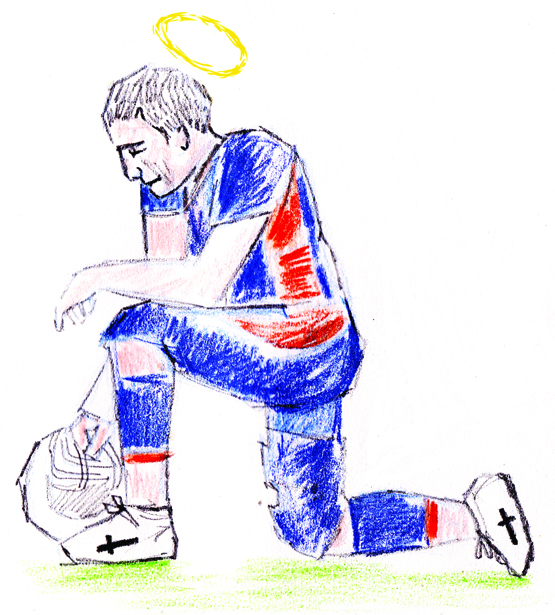Earlier this week, we sat down with Leisha Strachan, assistant professor of sports psychology at the University of Manitoba, to hear her views on the value of religion in Tim Tebow’s football performance.
Strachan is very upfront about the Tebow phenomenon: “It isn’t anything really new that’s happened in sports. It’s happened throughout history and a combination with spirituality and sports.”
Sports, and football in particular, are no stranger to public displays of spirituality. According to Strachan: “You see praying before practices, thanking god after practices and pointing to heaven.”
She says Tebow isn’t any different from religious athletes before him who chose to publically display their faith. The “Tebow” — a crouched bow Tebow does on the field, isn’t that unusual in sport.
“Tebow is very vocal about his faith and very demonstrative about how he displays his beliefs and it’s something people are taken aback from,” Strachan said.
Tebow’s faith became a popular topic among college football fans in the 2009 BCS Championship game between the Florida Gators and Oklahoma Sooners. During the game, Tebow had John 3:16 written on his face in eye black. The oft-quoted bible verse reads: “For God so loved the world that he gave his one and only Son, that whoever believes in him shall not perish but have eternal life. (NIV)”
Coincidentally, Tebow threw 316 yards in a playoff win over the Pittsburgh Steelers on Jan. 8th, 2012. This accomplishment raised Tebow mania to a new level.
Tim Tebow comes from a very religious background; his father, Bob Tebow, is the founder of the Bob Tebow Evangelistic Association in Jacksonville, Florida. It isn’t surprising that Tebow capitalized on his public image to lend support to various causes he believes in — including a Focus on the Family ad shown during the 2010 Super Bowl.
Strachan doesn’t find Tebow’s religious stances to be surprising.
“Spirituality is such an aspect of the self and an aspect of wellness. It’s important to be physically well, mentally well and spiritually well. So, spirituality is linked to someone’s identity and so it’s something is a big part in the development of the self. His belief really defines who he is. [ . . . ]”
Some find Tebow’s overt faith off-putting, while others embrace it — this has made him a polarizing figure in sports. Look at any sports blog, such as SBnation, Deadspin or Grantland — writers love to either praise or take swipes at him. ESPN commentators are the same. In the wild social networking world of Twitter and Facebook, people have nice and nasty opinions about Tebow when it comes to his ability, faith and public displays.
Part of the hate stems from Tebow’s statistics, which don’t put him at the absolute top of the pile; but he wins, which is what matters. He is the true underdog. Strachan agrees: “Everyone loves a story of an underdog. Even if he wasn’t shown on ESPN, he would still be popular.”
Tim Tebow isn’t likely to leave the public spotlight anytime soon, so he and his public displays of faith will likely garner plenty of attention in the years to come.





